
The Piper's Role
for Weddings, funerals, functions and events.


|
Mitchell's NZ Highland Piper Information: The Piper's Role for Weddings, funerals, functions and events. |

|
The role of the Highland Piper in our NZ
society.
An Piobaire.
A
bagpipe player (solo piper) for that wedding
or special function, or a pipe band for your event?
Free Referrals for most places in New Zealand.
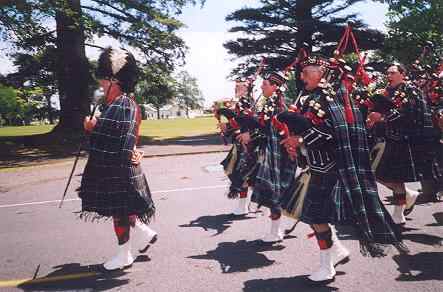 |
The Piper's role in NZ.
The piper, as a bagpipe player is called, performs an important role in the culture of those New Zealanders who are of or descended from a predominently Celtic British / Irish cultural background.
Pipers (either as solo performers or as a pipe band - where pipers are joined by drummers) may be called on to perform at; weddings, funerals, celebrations, street parades, anniversaries, official functions for dignitaries, at public and private functions, political rallies, protest marches, international sports matches, University capping parades and many other occasions.
A piper adds an extra dimension to any proceedings. Pipe music plays to the emotions and your spirit as well as to your ear. Love it or hate it you cannot ignore the music of the Highland bagpipe of NZ.
(If you're interested in reading more about piping, bands, regiments etc visit the web-site of the Wellington Scottish via our link page 2. See menu bar at bottom of this page.)
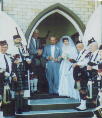 |
With emphasis on Wedding Piping, the Piper's role is:
The piper leads and the bride with escort follows immediately behind. It is deemed an honour to be piped into an assembly, and the bride is the person for whom the honour is intended, not the flower girls or the bridesmaids.
Flower girls could perhaps, if casting petals or flower heads, do so before the bride was piped, but would do so before the piping commences. In some situations the maids of honour or bridesmaids precede the bride to herald her imminent arrival. Such is not really appropriate when the entourage is being piped in. Their function is that of maids or attendants/servants to attend to the train etc. A person being piped in requires no other form of herald. For practical purposes the distance by which the bride and escort follow the piper needs to be sufficient that people and photographers have a clear view.
If the building or room in which the marriage is to be performed is considered too small for the piper to lead up the aisle, or has poor acoustics (sound reverberations for faint folk) then it may be appropriate for the piper to step aside as the bride enters. And to continue piping until her procession is completed.
There were no acoustic problems with the location below. Here a feilidhmhor clad piper from Mitchell Kilt Hire & Wedding Pipers plays the bride up to the ceremony location on the hills above Wainui Beach, at Raglan, New Zealand. The bridal entourage has just alighted from the horse drawn coach. The Clydesdale wedding horses were lead by the piper across the paddocks in the vicinity of of the Wainui reserve. The Clydesdale horses stepped high for the occasion and well knew they were an important part of the procession. (Taken from an original photograph provided by Dave Johnston and his bride . This may not be used or reproduced without permission.)
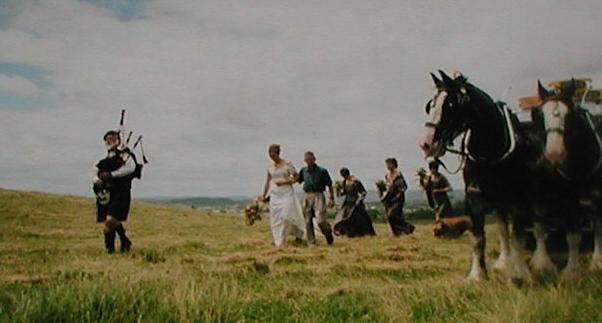
Why does the Piper lead?
The position of the piper in traditional terms is unique. If a chief fell in battle for example, or was incapacitated, the piper could step in and make decisions and basically take command on the spot in the absence of a pre-determined substitute. Though this could depend on the clan. The piper could perform betrothal ceremonies and other duties. The piper is both a herald and a vanguard, a soldier and a dignitary. Pipe-music vanquishes the foe (any spirits of ill-will or ill-fortune), heralds the arrival of the honoured guest, visitor, or dignitary, or principal of the occasion (eg a bride), and announces the importance of the occasion and the person following. The piper creates impact as the music proclaims to the gathered assembly (eg. wedding guests), that they take notice as the person enters.
Pipe bands once
traditionally lead parades in recognition of the gallant bravery
of pipers of old. In the First World War pipers often played
troops over the top and beyond. "Beyond" sometimes
meant that the piper played ahead of the advancing infantry . On
more than one occasion the advancing piper actually penetrated
enemy defence lines ahead of the attacking armed infantry.
Exemplary bravery or madness according to some critics. This lead
position had a tremendous psychological boost on the attacking
infantry ranks. Eventually enemy defenders recognised this
phenomenon and they started shooting the "unarmed
musician". British regiments began loosing too many pipers
and they were eventually withdrawn from the advancing ranks.
Incidently piper's who play the great highland bagpipe are the
only persons to play any musical instrument that has been
proclaimed by a court of law to be "an instrument or weapon
of war". This distinction was pronounced after the battle of
Culloden. The highland bagpipe thus joined the ranks of swords,
dirks, muskets, pikes, canon, halberds and the rest of military
weaponry.
Pipe tunes.
Many are the tunes
composed for significant events, battles, retreats, losses, laments,
individuals, family, hosts and guests. Some tunes played to-day recall
events in the Peninsula War, wars between clans, wars between nations,
meetings, re-unions, anniversaries, births, deaths and marriages.
As well as every other imaginable event.
For a wedding processional
tunes can be specially composed for the occasion, transcribed
from other media and instruments (if appropriate to the bagpipe
scale) or selected from a vast range of bagpipe tunes. Perhaps
the traditional tune in NZ is 'Mairi's Wedding'. This is normally a
march/song but it can be played slower with suitable accent, so
the bride can proceed with grace and poise. One standard 4/4 version (there are many
variants) is shown below.
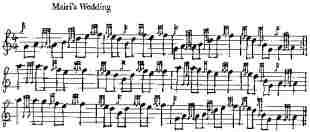 |
Bagpipe music is also suitable while signing the marriage register, so long as the ceremony position can be seen by the piper, or if the ceremony position cannot be seen, then an usher would need to be appointed to indicate to the piper that piping can cease when appropriate to the tune being played.
The music would usually start when people move forward for the signing and will stop when the minister/celebrant is collecting up the forms and people are all moving back to their original positions. The music should not stop abruptly but continue until the end of a measure or phrase so the tune has a logical termination. In my experience it is appropriate to play tunes offering a variety of tempos; Slow Air, Strathspey, Waltz, Reel, Air, Jig etc.. Too many slow airs or waltzes would detract from the happiness of the occasion.
For the recessional, both the groom and bride are piped down the aisle. Usually they are lead out to a lively celebratory tune. Some tunes
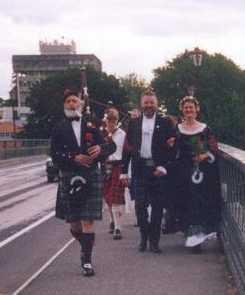 Crossing Victoria Bridge, Hamilton |
In a traditional highland wedding once the guests were out of the kirk (church), the piper would strike up and lead everyone to the wedding breakfast at the village hall or wherever it was being held. Whether it was 25 yards or a mile or more, to the tune "Highland Wedding" and others. Today people gather around for photographs and it is usual for the piper to play a medley of tunes from a position which permits guests to talk and congratulate the couple and for the photographer to arrange folk for photos.
When the photographer wants to organise a photo of all guests the piper normally stops so everyone can hear their instructions. The piper is usually included in the group photo. A photo with the bridal couple can function as the official termination of the piper's duties.
In summer in NZ the availability of some refreshment for the piper is always appreciated. With current driving laws the refreshment need not be alcoholic, though some folk find it hard to envisage anything but whisky passing through a pipers lips on such occasions.
Use of the piper at the reception is usually separate to the wedding ceremony unless the function is at the same venue and there is little delay in piping the couple to the head table. If the two are separate locations or venues, or there is a significant period where the bridal party are away for location photographs, then an extra fee can be expected. The piper can be included as a guest and later be involved by piping for some of the dancing - especially if you intend having a Ceilidh style dance to celebrate.
Paying the Piper?
"He who pays the piper calls the tune." This is an old saying and although there are a few people who think a piper should play for free. (And some sassenachs think "not at all"). The fact is pipers have been for centuries, officials and musicians of some standing. They were paid appropriately for their services, even in the ancient world of Mesopotamia, Eqypt, Greece, Rome and many other nations. There are stories of pipers going on strike in ancient Rome, for not having been paid their due fees by the authorities.
In Celtic society the harpist and piper were very important and were well rewarded for their services. The old saying "it takes seven years and seven generations to make a piper" indicates the degree of experience and expertise it took to learn and memorise all the tunes a piper was required to play. Many tunes were only ever played for particular occasions.
The piper has appearance and accoutrements to maintain, practise to do and a wilful instrument to master and maintain. The truth is there are many people who would like to be a piper. Of those that actually make a start on learning only a small percentage succeed. It takes dedication, drive, persistence, practise and attitude. Combine this with a love and ear for the sound and music and a place in which to learn and practise. Pipers usually pay for their tuition. An except ion can be when they have joined a pipe band and only learn pipe-band piping. Certainly solo-pipers (those that play on the competition board or play as an individual piper at various functions or for dancing) would have all paid to have tuition. If we go back to the ancient world we would see that pipers were often chosen individuals who were sent to a special school for seven years to learn all the techniques, traditions and aspects of being a piper. This was expensive and the patron had good reason to choose the individual carefully.
After the Pied-Piper of Hamlin cleared rodents from the German town of Hamlin he took exception to folk not paying for his piping. He therefore spirited away the children to particular tunes, much to the dismay of the townsfolk. Fortunately perhaps, extremely few pipers know the "fairy airs" necessary to perform the feats this character was capable of. However it demonstrates the piper should be rewarded properly and that pipe music can have a dramatic effect on events.
Where family is involved the piper usually has other reward than a monetary one. Over the years, because of the number of pipers New Zealand produced and the family basis of the pioneer settlements, the role of the piper became simply a part of the social fabric. Their availability was as much from the love of pipe-music and their will to preserve the social traditions and heritage, as it was for the need of the community. The concept of special payment for the piper sometimes became overlooked and the piper even became taken for granted, or for a bottle of whisky. There are proportionally fewer pipers today so pipers and pipe-bands are not as evident in the community at large.
In clan days the chief was often the pipers patron and covered his expenses. In the army the piper was remunerated by his officer and eventually the position became funded by the army. Pipers were also outfitted by either his chief, or his officer, or the army, and often the bagpipes were provided by one of those sources as well.
Today the piper provides his gear, accoutrements and bagpipes. Sometime these may belong to the pipe-band if the piper is a band member but often pipe-bands do not approve the use of band uniform for other than a band function. The outfit is expensive and needs maintaining. Reeds and pipe-bags need replacing periodically. Kilts and gear require maintenance and replacement to maintain appropriate appearance. Travel to and from functions is often over longer distances. To cover these factors the pipers services need to be rewarded. That's a long winded way of saying in modern idiom; "it's user pays". Payment can consist of: A) The booking fee, if the was one, plus B) the fee balance paid on arrival at the function or as soon as possible during the proceedings. Handing over of payment is normally the responsibility of the bride's escort or the best man, though the funding may come from the groom, the bride's family or a caring benefactor.
If you want a good piper for your wedding you should be paying a professional rate that covers a basic two hours, plus travel, plus extra if the engagement will involve over two hours, as negotiated. Why should you pay for this amount of time if you only want 5 minutes of tunes?
It is rare that a piper could get away after only five minutes of playing and if you really need an answer to this you could use a tape or CD an amplifier and some speakers. Flicking a switch requires little practice, no time for polishing leather and care of accoutrements and uniform, no time for dressing, or travelling. No skill in tuning the instrument, or having to spend hours memorising all the tunes. Nor does flicking a switch provide the aura and spectacle of a piper, your personal piper! Not even for a few minutes. A piper can stop and start when appropriate. An experienced piper can read the situation and meet your needs without your having to think about it at the time.
For ceremony as well as music, the piper can take command of the situation, of people's emotions, of your very spirit, and control the mood of the whole event.
If you're serious about
having a good piper, be prepared to pay around $NZ300+* for an
engagement within a radius of 25 km from the pipers base.
The alternatively, might be to plan ahead. Have someone in your
family start learning 7 years** ahead of the
event. Get them a set of Scottish, bagpipes (somewhere between
$NZ1900-$NZ12000)[not a cheap set made on the Asian continent out
of poor quality wood], get them a full highland outfit (somewhere
between $NZ1500-$NZ4000) and then have them competent in playing
memorised music in public. It's an interesting challenge.
Mitchell's MKH Bagpipe Services
can assist you with this future planning: bagpipes,
music, uniform etc.
There is more information on the web-site at page mitcwedg.htm
If you're after a pipe band, you'll need to approach a band in your area. Their cost will be considerably more than a solo piper and vary depending on the individual band policy. Up-keep on band uniforms is costly. How the band finances equipment, reeds, unforms and travel will vary. Community grants are one source but donations and other funding efforts are other avenues for funding.
*Price will vary depending on engagement, time,
town/city and piper.
** 7 years: Actually the tale is ..... "it takes seven years
and seven generations to get a really qualified piper." In
truth it's not quite as long as that, but you may have to plan ahead.
© Copyright 2002-9 B.E.Mitchell. All images on this page may not be reused without the owners consent and recognition of the source of the image.
For a Solo Piper or a group of pipers, refer to mitcpipr.htm The page in this link includes link to a selection of pipers from around New Zealand.
For Pipe bands refer to mitlink2.htm The page in this link lists some regional Pipe Bands. Click cambpipe.htm for the Cambridge & Districts Pipe Band.
| Mitchell's Bagpipe Services for FREE bagpiping information. |
| Copyright © 2002-25 BEMitchell |
Main MKH Page | Top | Contact Us | Link Pages 1 2 3 4 5 |